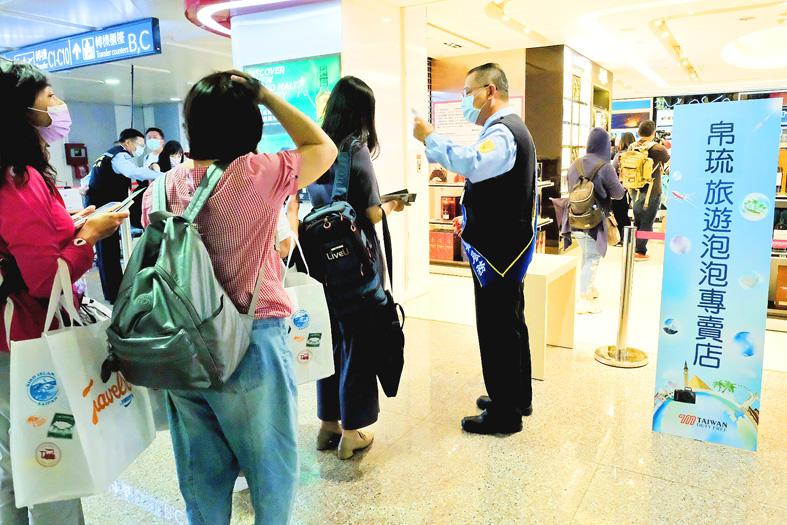The first batch of tourists to visit Palau under a COVID-19 “travel bubble” returned to Taiwan at about 10:30pm on Sunday, with several passengers saying they felt blessed to be able to travel abroad safely during the pandemic.
The Central Epidemic Command Center (CECC), along with the Ministry of Foreign Affairs and the Ministry of Transportation and Communications, last month announced the opening of a “travel bubble” between Taiwan and its ally Palau, exempting the travelers from quarantine after arrival in either country.
The first flight to Palau took off from Taiwan Taoyuan International Airport on Thursday afternoon, after the passengers tested negative for COVID-19 in a polymerase chain reaction test taken at the airport in the morning. The 100 passengers were divided into seven tour groups.

Photo: CNA
The returning passengers received a smartphone message from the Ministry of Health and Welfare asking them to fill in a passenger health declaration form and received a self-health management notice upon arrival at the airport.
Taoyuan International Airport Corp (TIAC, 桃園國際機場) had arranged a special entry route for the returning passengers, with a designated duty-free shopping area, restrooms and immigration counter separate from other passengers.
A man, surnamed Chen (陳), who joined the tour, said that tour group members followed regulations, including staying with the group and practicing disease prevention measures during the trip, so he felt blessed that Taiwanese were able to travel abroad safely during the pandemic.
TIAC chief executive Jerry Dann (但昭璧) said the entry process went smoothly, as the company, the CECC, the Tourism Bureau and other government agencies worked together in designing the special route and making the arrangements.
As it was the first trip, the tour guides and tourists might have been unfamiliar with some procedures, so there is room for improvement, he said.
However, overall, the operation went smoothly, with all passengers completing customs checks before 11:17pm on Sunday, he added.
Separately, Centers for Disease Control Deputy Director-General Chuang Jen-hsiang (莊人祥), who is also the CECC spokesman, yesterday reported one new imported case of COVID-19: an Indonesian student.
The student, who is in her 20s, arrived in Taiwan on March 21, and did not show any symptoms at the time, but reported that she had close contact with a confirmed case in Indonesia.
The student tested positive on Saturday upon ending centralized quarantine, Chuang said.
Additional reporting by CNA

The Ministry of the Interior (MOI) is to tighten rules for candidates running for public office, requiring them to declare that they do not hold a Chinese household registration or passport, and that they possess no other foreign citizenship. The requirement was set out in a draft amendment to the Enforcement Rules of the Public Officials Election and Recall Act (公職人員選舉罷免法 ) released by the ministry on Thursday. Under the proposal, candidates would need to make the declaration when submitting their registration forms, which would be published in the official election bulletin. The move follows the removal of several elected officials who were

The Republic of China (ROC) is celebrating its 114th Double Ten National Day today, featuring military parades and a variety of performances and speeches in front of the Presidential Office in Taipei. The Taiwan Taiko Association opened the celebrations with a 100-drummer performance, including young percussionists. As per tradition, an air force Mirage 2000 fighter jet flew over the Presidential Office as a part of the performance. The Honor Guards of the ROC and its marching band also heralded in a military parade. Students from Taichung's Shin Min High School then followed with a colorful performance using floral imagery to represent Taiwan's alternate name

FOUR DESIGNATED AREAS: Notices were issued for live-fire exercises in waters south and northwest of Penghu, northeast of Keelung and west of Kaohsiung, they said The military is planning three major annual exercises across the army, navy and air force this month, with the navy’s “Hai Chiang” (海強, “Sea Strong”) drills running from today through Thursday, the Ministry of National Defense said yesterday. The Hai Chiang exercise, which is to take place in waters surrounding Taiwan, would feature P-3C Orion maritime patrol aircraft and S-70C anti-submarine helicopters, the ministry said, adding that the drills aim to bolster the nation’s offshore defensive capabilities. China has intensified military and psychological pressure against Taiwan, repeatedly sending warplanes and vessels into areas near the nation’s air defense identification zone and across

A Chinese takeover of Taiwan would severely threaten the national security of the US, Japan, the Philippines and other nations, while global economic losses could reach US$10 trillion, National Security Council Deputy Secretary-General Lin Fei-fan (林飛帆) wrote in an article published yesterday in Foreign Affairs. “The future of Taiwan is not merely a regional concern; it is a test of whether the international order can withstand the pressure of authoritarian expansionism,” Lin wrote in the article titled “Taiwan’s Plan for Peace Through Strength — How Investments in Resilience Can Deter Beijing.” Chinese President Xi Jinping’s (習近平) intent to take Taiwan by force